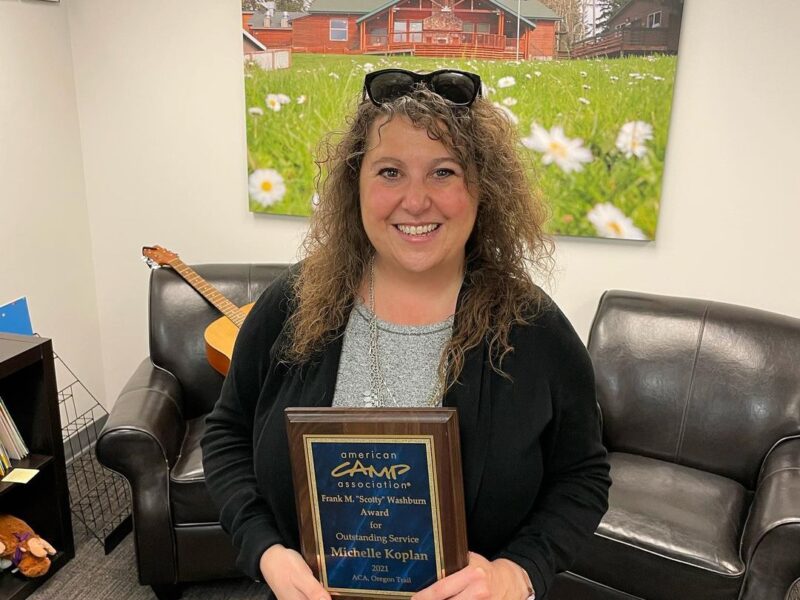
How do you ensure your child will be a happy camper this summer? Kevin Nissen, camp director of Friendly Pines overnight camp in Prescott, has been helping do just that since 1990. Established in 1941 by Bud and Isabelle Brown, the camp is owned by their daughter, Bebe Brown May.
Kevin started his career with Friendly Pines as a counselor back in 1978. Arizona Jewish Life asked this Arizona camp expert to answer some questions for parents considering sending their children to overnight camp.
Q: Is it important for the camp to be American Camp Association (ACA) accredited?
A: The ACA is the only accrediting body in the industry – and the process of getting accredited is extensive. ACA accreditation is the only real way for a parent to know if a camp is meeting standards in the areas of staffing, safety, programs, healthcare, training, supervision, transportation, etc.
Q: How do you know if your child is ready for overnight camp?
A: First of all, if a child expresses any interest, he or she is probably ready. If they have spent the night away from home, they are probably ready. Not surprisingly, we in the camp business believe that every camper is ready. They will all acclimate to the new environment at different paces, but in the end, they will acclimate.
The way a camper becomes ready for overnight camp is to go to overnight camp. I realize that sounds like an approach from another era, but aren’t a lot of things like this? Learning to swim. Learning to read. Learning to like new foods. Granted, sending your child off to summer camp is a bigger leap of faith than having him or her try broccoli, but parents should rest assured that a well-established, accredited camp will keep their children safe and provide them with every chance in the world to grow and be happy.
Q: Is there an ideal age for overnight camp?
A: There is no perfect age to go to camp. The prevailing feeling among parents, however, is that 6, 7 and 8 are too young. While that may be true for many children, parents would be surprised how well younger campers do. Younger campers live so much more in the moment that they are easily distracted from thoughts of home; an 11- or 12-year-old who has never been away from home might struggle a bit more.
Q: What is a good camper-to-staff ratio?
A: The optimum camper-to-staff ratio in a cabin will vary by age. Younger campers need more help with hygiene. They need to be reminded to change their clothes. They need help keeping their area clean and brushing their hair. The older the campers, the easier it is for a single counselor to manage a larger number. The ACA requires a maximum staff-to-camper ratio of 1-to-6 for campers ages 6 to 8; 1-to-8 for campers ages 9 to 14; and 1-to-10 for campers ages 15 to 18. Many camps maintain ratios lower than the ACA maximum, so ask the camp director.
Q: What about staff training?
A: The ACA requires that staff working at most resident [overnight] camps have a week of training before campers arrive. This training should include camper management, appropriate staff-camper relationships, behavior management, child development, communications skills and others that will [help] make a counselor skilled in the best childcare practices. Any good camp will be happy to share what their staff training covers.
Q: What kind of background screening should parents expect from camps?
A: After camp administration interviews a potential staff member and then checks his or her personal references and health history, they run a professional, nationwide background check that includes the National Sex Offenders Public Website – a mandatory standard of the ACA. Background checks apply to all staff: new, returning, year-round, voluntary, contracted, etc. Anyone who will be in contact with campers must be checked.
Q: How should a camp handle homesickness?
A: There are varying approaches on handling homesickness, but most camps recognize missing home as a difficult but necessary part of growing up. Those first ventures into the world of independence and self-reliance can be tricky for any boy or girl – no matter how confident they may seem at school or on sports teams. And though it may be easier on everyone to give in and send the camper home at the first signs of homesickness, it may not be in the camper’s best interests. If both camp and parents resolve to work as a team to encourage and support the camper, all campers will eventually adjust to being away from home. Parents should check the camp’s policy on calling home. Experience has shown that calling home doesn’t help that much in curing homesickness; in fact, it usually makes it worse. It’s best to find out beforehand how a camp will handle a homesick child.
Q: How should parent-camper communication be handled?
A: Most camps do not allow phone calls home for reasons of logistics and camper adjustment. Most communication between camper and parent is done the old-fashioned way: by mail. Some camps print out emails and distribute them at mail call. The biggest challenge for some parents is that they will not get a daily status report directly from the camper, which can be a deal-breaker. Many camps will have someone on staff assigned to talk to parents about their children and let them know how the campers are doing every day. Again, find out beforehand how a camp will keep parents informed about their campers. The camp should have a clear set of procedures.
Q: Should kids go with friends, or is it better if they go on their own?
A: There are arguments on both sides. Going with a friend can reduce stress if a camper is a bit anxious. Many parents, however, prefer sending their child alone. They find that when a camper must navigate a new environment and make new friends, the camp experience is richer and more impactful.
Q: How should a camp handle discipline?
A: There are obvious things they shouldn’t do. They shouldn’t touch a camper. They shouldn’t haze campers with things like push-ups. They should never deal with campers out of the view of others. There are many techniques for managing camper behavior, which should be covered and practiced in staff training. In general, camps will use systems that involve positive reinforcement.
Q: Should parents ask for references from a camp?
A: Any camp should be able to provide you with a list of camp families willing to speak honestly about the camp. The list of parents should include those who match your own family’s circumstance; i.e., parents of boys, parents of girls, parents of young campers, parents of teens, parents of first-time campers or parents of children with special needs.
Q: How should you prepare a child for camp?
A: Seeing the camp is a great way to prepare a child for camp. Walking the grounds and inspecting a cabin removes some of the mystery. Be positive about the experience. Don’t ask things like, “Are you nervous about camp, Billy?” If he isn’t, the question is moot. If he is, the question may only make things worse. Instead, be encouraging. Tell your camper how excited you are for him or her and about all the fun that awaits. Be cool about it.
It’s important for parents to realize that the experiences and lessons campers take away from their time at summer camp will be profoundly personal. The lessons may not be what you expected or the same ones that influenced you when you were a camper. Your camper will be doing the “heavy lifting” in this project. He will be making his own choices. She will be making her own mistakes and feeling the consequences. Counselors are always at the campers’ side to encourage and support, but when campers fail [at something], they alone will decide whether to pick themselves up and try again. The experience will be all theirs.
Parents need to be confident that they have selected a camp that will keep their loved ones safe and lovingly mentored. Sometimes it’s hard for parents to allow this much distance between themselves and their children, but they need to trust that they have raised children capable of making this important journey of self-discovery.




